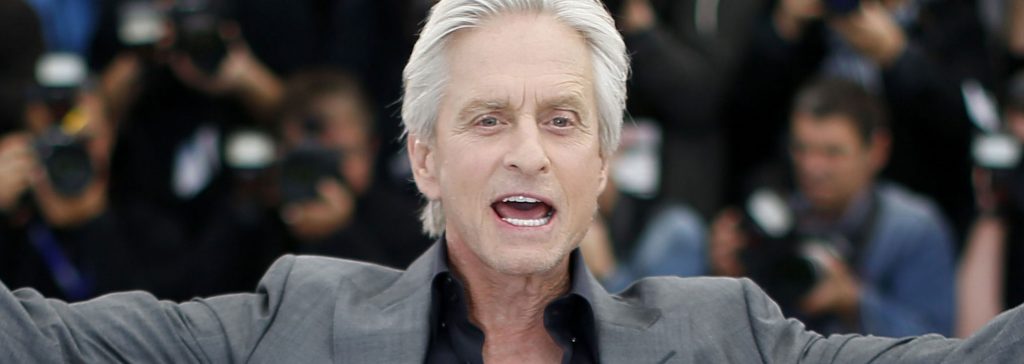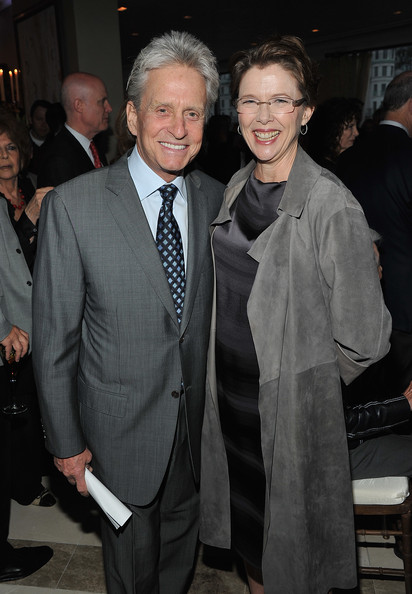Alex writes a belated appreciation of Michael Douglas and Annette Bening.
This is going to sound a little odd, because I’m about to write a bunch of words that convey something like “Michael Douglas and Annette Bening are not seen as movie stars,” which is a statement that immediately proves itself wrong simply because you recognize those names as people who star in movies. Ipso facto, movie stars. People with a weaker knowledge of cinema than I will remember them long after they are dead and – barring a degenerative brain disease – I would imagine I’ll still remember the answer to the question “Who played Gordon Gekko?” on the day I die*. All of that said, this is a piece about not realizing obvious truths, so this piece must start with an obvious truth.
*A brief selection from my presumed eulogy: “He died doing what he loved: dominating at movie trivia.”
Around the time of our Traffic podcast this past winter, I began to think about Michael Douglas as an undervalued Hollywood presence. Traffic was a decidedly adventurous movie built upon a variety of unadventurous pillars: it was at its core a crime movie that featured action, intriguing double crosses, and a bona fide movie star role. When the movie was being sold, the filmmakers had pictured Robert Wakefield being played by Harrison Ford, who as the time ran out on the 1990s was still operating in truly rarefied Hollywood air. For various reasons, Ford did not take the role, vacating a space that was eventually filled by Michael Douglas. I saw the film in theatres, I liked it, and I liked Michael Douglas in it. I bought the film on VHS, and I watched it ten times through high school, and probably another five through college after I upgraded to the DVD. It was my gateway drug to cinematic abstraction. And yet I never realized those abstractions were still eased by the presence of the legacy star at its centre.
When I saw the exceedingly mediocre Danny Collins in the summer of 2015, I obviously did so for Al Pacino. If you put that aging scarf lover in your movie, I’m (probably) going to watch it. I enjoyed his performance in the movie, but I recall leaving the theatre thinking that it fell flat pretty much anytime his co-star wasn’t onscreen. I was at the screening because of Al, but I began to realize the reason I didn’t leave is because of Annette.
Annette Bening was a key part of another film I loved that was released as I was on the precipice of entering high school (albeit one that has aged less gracefully than Traffic). American Beauty was a movie I watched probably fifteen times, and yet the impetus for pressing play was never, “I want to watch that dynamite Annette Bening performance again.” It was the score, or the cinematography, or Dr. Spaceman’s perfectly loud overacting that kept me returning. At times I think I actively claimed to dislike Bening’s performance, presumably due to the Skyler White effect*. In the years following, I always viewed her as the woman from American Beauty and viewed each performance she gave as another in a long line from a performer whose legacy I never totally understood. I was decidedly not floored by The Kids are All Right. Then, in Danny Collins, I saw her stand toe to toe with the person I consider the most entertaining dramatic actor in the history of cinema. I began saying to people, “Guys, Annette Bening might be a great actor,” to which most people looked at me oddly. They either never thought about Bening and thusly didn’t care, or they already viewed the statement as an obvious truth.
*This occurs when the lead character in a film or television show – Lester Burnham or Walter White in this case – acts irrationally in a way that is tremendously entertaining to viewers but would be impossible for their significant other to deal with. The S.O. in each case makes cautious, rational moves to curb their partner’s choices – like, “Hey, stop selling meth because you’re ruining our family and also other lives,” or “We can’t keep making out because I’m worried you’ll spill that beer on the couch” – that makes them seem like villains to us, because we are positioned to root for Lester to continue having the most fun possible with his mid-life crisis, or for Walt to keep selling meth. They’re vibe ruiners, Cady. They ruin vibes.
After the Traffic podcast, I put some thought into why I had never viewed Michael Douglas as a charismatic presence who had been prominently involved in my formative ventures into the world of watching way too many movies. Conveniently, I saw Bening’s stellar performance in 20th Century Women around the same time, leading to much head shaking over how much time I spent wasting not appreciating Bening’s work. As with all mistakes from years ago in my life, I pondered them exhaustively.
The most important part to think about is a relatively obvious one: neither thespian is known for being particularly versatile. Bening and Douglas are each captivating screen presences, but the walk from Carolyn Burnham to Dorothea Fields or Gordon Gekko to Robert Wakefield is a relatively short one. Blanchett and Day-Lewis they are not (because nobody can be). But all movie stars continue to trade on long-established personas, and most people don’t dramatically change their workday every year, so the appeal of comfortable sameness to Bening and Douglas is understandable. If I was that good at anything I’d probably do it everyday too.
So the question becomes a sort of ‘why now?’ I have watched so many movies starring one or both of them – this is the part where the writer notes they romanced each other in Aaron Sorkin’s West Wing training ground The American President – that it probably should have taken less than two decades to realize. Neither performer ever seemed truly uncool to me, but they didn’t necessarily seem cool either. Time changed that, because time changes all.
Reading the metaphorical tea leaves, it seems as though Bening is the one seen as the more interesting of the two, the one who will be embraced by my generation for longer*. Douglas is too old Hollywood; he’s a legacy star who is so representative of the old world that he’ll never be interesting to us millennials. Bening on the other hand is only old Hollywood adjacent: she’s married to Warren Beatty, but to people of my age, Beatty has gone from Clyde Barrow to the guy with the envelope (and Bening was not present that evening for a cutaway during the chaos). She also simply seems like a thoroughly cool woman; I am confident that if given the chance to spend an hour with Douglas and Bening separately, I would find the old Hollywood questions I get to ask Douglas more interesting, but I would ultimately enjoy talking with Bening more.
*Admittedly, it helps that Bening is fourteen years younger.
There is a certain kind of appeal to an actor who is simply able to be present, one who never lets you down. Being comfortable in their pervasive talents can only come from years and years of avoiding your scorn; but by never becoming bad, these consistently wonderful performers never become properly recognized for their work. Take the aforementioned star of Danny Collins: Pacino’s career features some performances I out and out dislike, so I’m able to properly appreciate the ones where he succeeds. (It is here where I shall note that both Bening and Douglas have a plethora of bad movies on their filmographies, including some bad movies where they might give bad performances. The catch is they were always consistently good in the movies I actually saw them in. I’m not going to see a late career Rob Reiner film, as such And So It Goes… remains uncritiqued and I remain unaffected. That said, I assume Michael Douglas was fantastic in it.) It is Bening and Douglas’ persistent skill that ends up making them seem less obviously fantastic, even though they are obviously fantastic.
It is certainly key to reiterate that each of these actors were prominent members of the ensemble cast filling up the never-ending string of movies I was watching throughout my youth. I generally consider the turn of the millennium as the most important period of filmmaking to building whoever the simulacrum/person who is writing this piece became, and both Bening and Douglas were there constantly at that time. They were omnipresent, and even before I saw their work I knew they were both meant to be seen as important. Only after decades of existence have I begun to accept them as not only a part of my filmgoing life, but a part of my filmgoing life that only gets more and more valuable as years pass and I realize how interesting and important what they provide me with has been. Film has become more knowable, so the minute number of stars that remain to intrigue me become more important. Better it happen now, because one day they’ll be gone.






